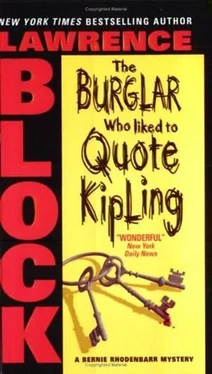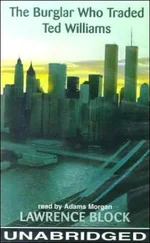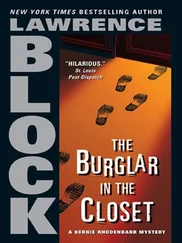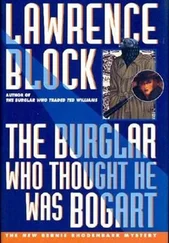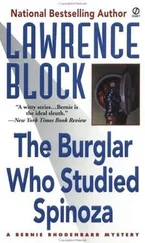Lawrence Block - The Burglar Who liked to Quote Kipling
Здесь есть возможность читать онлайн «Lawrence Block - The Burglar Who liked to Quote Kipling» весь текст электронной книги совершенно бесплатно (целиком полную версию без сокращений). В некоторых случаях можно слушать аудио, скачать через торрент в формате fb2 и присутствует краткое содержание. Жанр: Триллер, на английском языке. Описание произведения, (предисловие) а так же отзывы посетителей доступны на портале библиотеки ЛибКат.
- Название:The Burglar Who liked to Quote Kipling
- Автор:
- Жанр:
- Год:неизвестен
- ISBN:нет данных
- Рейтинг книги:4 / 5. Голосов: 1
-
Избранное:Добавить в избранное
- Отзывы:
-
Ваша оценка:
- 80
- 1
- 2
- 3
- 4
- 5
The Burglar Who liked to Quote Kipling: краткое содержание, описание и аннотация
Предлагаем к чтению аннотацию, описание, краткое содержание или предисловие (зависит от того, что написал сам автор книги «The Burglar Who liked to Quote Kipling»). Если вы не нашли необходимую информацию о книге — напишите в комментариях, мы постараемся отыскать её.
The Burglar Who liked to Quote Kipling — читать онлайн бесплатно полную книгу (весь текст) целиком
Ниже представлен текст книги, разбитый по страницам. Система сохранения места последней прочитанной страницы, позволяет с удобством читать онлайн бесплатно книгу «The Burglar Who liked to Quote Kipling», без необходимости каждый раз заново искать на чём Вы остановились. Поставьте закладку, и сможете в любой момент перейти на страницу, на которой закончили чтение.
Интервал:
Закладка:
Carolyn said, “I’m lost, Bern. What was he going to sell him?”
“The Deliverance of Fort Bucklow.”
“I thought he already did.”
“He sold him the Rider Haggard copy. Now he was going to sell him something a little special.” I tapped the book on the counter. “He was going to offer him this copy,” I said.
“Wait one moment,” Prescott Demarest said. “You have me utterly confused. That copy in front of you-it’s not the one you took from this man Arkwright’s home?”
“No. That copy left Madeleine Porlock’s apartment in the possession of the man who killed her.”
“Then the book in front of you is another copy which you found in her closet?”
I shook my head. “I’m afraid not,” I said ruefully. “You see, the copy from the shoe box in the closet was a second Rider Haggard copy, and how could my client possibly sell it to the Sheikh? He’d already done that once. No, this is a third copy, curiously enough, and I have to apologize for lying earlier when I told you this was the Porlock copy. Well, see, maybe I can just clear up the confusion by reading you the inscription on the flyleaf.”
I opened the book, cleared my throat. God knows I had their attention now.
“ ‘For Herr Adolf Hitler,’ ” I read, “ ‘whose recognition of the twin Damocletian swords of Mosaic Bolshevism and Hebraic International Finance have ignited a new torch in Germany which, with the Grace of God, will one day brighten all the globe. May your present trials prove no more than the anvil upon which the blade of Deliverance may be forged. With abiding good wishes and respect, Rudyard Kipling, Bateman’s, Burwash, Sussex, U.K., 1 April 1924.’ ”
I closed the book. “The date’s significant,” I said. “I was looking at John Toland’s biography of Hitler before you gentlemen arrived. One of the fringe benefits of owning a bookstore. The date Kipling supposedly inscribed this book was the very day Hitler was sentenced to five years in Landsberg Prison for his role in the Munich Beer Hall Putsch. A matter of hours after the sentence was announced he was in his cell writing the title page of Mein Kampf . Meanwhile, Rudyard Kipling, moved by the future Führer’s plight, was inscribing a book to him. There’s some rubber stamping in ink on the inside front cover, too. It’s in German, but it seems to indicate that the book was admitted to Landsberg Prison in May of 1924. Then there are some marginal notes here and there, presumably in Hitler’s hand, and some underlining, and some German phrases scribbled on the inside back cover and the blank pages at the back of the book.”
“Hitler might have had it in his cell with him,” Rudyard Whelkin said dreamily. “Took inspiration from it. Tried out ideas for Mein Kampf -that’s what those scribbles could indicate.”
“And then what happened to the book?”
“Why, that’s still a bit vague. Perhaps the Führer presented it to Unity Mitford and it found its way back to Britain with her. That’s not an unappealing little story. But all the details have yet to be worked out.”
“And the price?”
Whelkin raised his imposing eyebrows. “For Adolf Hitler’s personal copy of a work of which only one other copy exists? For a source book for Mein Kampf ? Inscribed to Hitler and chock-full of his own invaluable notes and comments?”
“How much money?”
“Money,” Whelkin said. “What is money to someone like Najd al-Quhaddar? It flows in as fast as the oil flows out, more money than one knows what to do with. Fifty thousand dollars? One hundred thousand? A quarter of a million? I was just beginning to dangle the bait, you see. Just letting that Arab get the merest idea of what I had to offer. The ultimate negotiations would have to be positively Byzantine in their subtlety. How much would I have demanded? How much would he have paid? At what point would the bargain be struck?” He spread his hands. “Impossible to say, my boy. What is that phrase of Dr. Johnson’s? ‘Wealth beyond the dreams of avarice.’ Avarice is quite a dreamer, you know, so his words might be the slightest bit hyperbolic, but suffice it to say that the book would have brought a nice price. A very nice price.”
“But not if Arkwright ruined the deal.”
“No,” Whelkin said. “Not if Mr. Arkwright ruined the deal.”
“How much did he pay you for his copy?”
“Five thousand dollars.”
“And the Sheikh? He’d already bought a copy with the Haggard inscription.”
He nodded. “For a few thousand. I don’t remember the figure. Is it of great importance?”
“Not really. How many other copies did you sell?”
Whelkin sighed. “Three,” he said. “One to a gentleman in Fort Worth who is under the impression that it was surreptitiously removed from the Ashmolean at Oxford by a greedy sub-curator with gambling debts. He’ll never show it around. Another to a retired planter who lives in the West Indies now after making a packet in Malayan rubber. The third to a Rhodesian diehard who seemed more excited by the poem’s political stance than its collector value. The Texan paid the highest price-eighty-five hundred dollars, I believe. I was selling off the books one by one, you see, but it was a laborious proposition. One couldn’t advertise. Each sale called for extensive research and elaborate groundwork. My travel expenses were substantial. I was living reasonably well and covering my costs, but I wasn’t getting ahead of the game.”
“The last copy you sold was to Arkwright?”
“Yes.”
“How did you know Madeleine Porlock?”
“We were friends of long standing. We’d worked together now and again, over the years.”
“Setting up swindles, do you mean?”
“Commercial enterprises is a less loaded term, wouldn’t you say?”
“How did a copy of Fort Bucklow get in her closet?”
“It was her commission for placing a copy with Arkwright,” he said. “I needed cash. Normally I’d have given her a thousand dollars or so for arranging the sale. She was just as pleased to have the book. She expected to sell it eventually for a good sum. She knew, of course, not to do anything with it until I’d had my shot at the big money with Najd al-Quhaddar.”
“Meanwhile, you needed Arkwright’s copy back.”
“Yes.”
“And offered me fifteen thou to fetch it for you.”
“Yes.”
“Where was the fifteen thousand going to come from?”
He avoided my eyes. “You’d have received it eventually, my boy. I simply didn’t have it at the moment, but once I was able to place the Hitler copy with the Sheikh I’d be in a position to afford generosity.”
“You might have told me that in advance.”
“And where would that have gotten me?”
“Nowhere,” I said. “I’d have turned you down flat.”
“And there you have it.” He sighed, folded his hands over his abdomen. “There you have it. Ethics are so often a function of circumstance. But I’d have settled with you in due course. You have my word on that.”
Well, that was comforting. I exchanged glances with Carolyn, came out from behind the counter. “The situation became complicated,” I said, “because a gentleman from India happened to be in New York at the same time as all of this was going on. Some months ago he had heard rumors about the Kipling property recently acquired by a particular Arab Sheikh. Now he was contacted by a woman who told him that such a book existed, that it was presently in the possession of a man named Arkwright, that it would soon be in her possession and that she could be induced to part with it for the right price.
“The woman, of course, was Madeleine Porlock. She learned somehow that the Maharajah was in town and evidently knew of his interest in Rudyard Kipling and his works. She had a copy of The Deliverance of Fort Bucklow , her commission for pushing a copy to Arkwright, and here was a chance to dispose of it. She offered the book to the Maharajah for-how much?”
Читать дальшеИнтервал:
Закладка:
Похожие книги на «The Burglar Who liked to Quote Kipling»
Представляем Вашему вниманию похожие книги на «The Burglar Who liked to Quote Kipling» списком для выбора. Мы отобрали схожую по названию и смыслу литературу в надежде предоставить читателям больше вариантов отыскать новые, интересные, ещё непрочитанные произведения.
Обсуждение, отзывы о книге «The Burglar Who liked to Quote Kipling» и просто собственные мнения читателей. Оставьте ваши комментарии, напишите, что Вы думаете о произведении, его смысле или главных героях. Укажите что конкретно понравилось, а что нет, и почему Вы так считаете.
